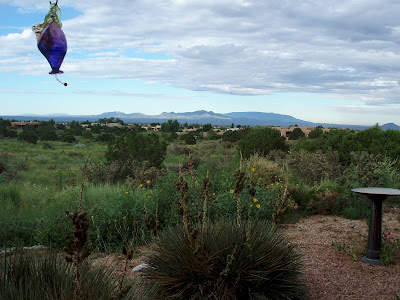 The great thing about a lightning storm is you don’t have to be all that lucky to see it.
The great thing about a lightning storm is you don’t have to be all that lucky to see it.
Contrary to the common wisdom about lightning, it strikes lots of times, over and over. I set my camera up on a tripod on our patio last night and just kept pressing the button until I caught the lightning. It didn’t take long. A little persistence. A lot of faith. And being willing to enjoy the night and watch the show while you wait for the perfect opportunity.
A lot like writing, yes.
Allison asked me if I was going to get my “First Sale” ribbon for my nametag at National. She was surprised that I said no. Technically, I could have, for Petals & Thorns, my Loose Id novella. Because, oddly enough, my erotic take on Beauty and the Beast qualifies as a first sale in the genre to RWA. If I make enough money on it, which it looks from early sales like I might, I can qualify to be part of the Published Author Network, or PAN. I’ll probably take that.
But first sale? No way.
I remember my first sale and what it meant to me. I sold an essay, Bullets, to Wyoming Magazine in 1997. They paid me and everything. Then I had a few pieces in literary magazines that didn’t pay, but made me feel snazzy. Redbook published one essay in 2000, which paid really well and made me feel snazzy. Everyone said I’d “arrived” at that point, which really wasn’t the case at all, but was nice to hear.
I remember when the acquisitions editor at University of New Mexico Press asked if she was in time to publish my first book. And when she told me the review board approved the essay collection she helped me put together. My launch party in January of 2004 for Wyoming Trucks was one of the best nights of my life. I was all about the first sale jubilation.
So, you can see why I didn’t care to get the ribbon. Or the notice in RWR (the RWA magazine).
I came to terms with this long ago (though I know I bring it up now and again), that RWA only considers an author published if the work is in a romance genre. It’s their prerogative and in line with the organization’s mission. What I do mind, though, is that somewhere along the way, I allowed this to make me feel like a newbie again. I feel like the kid sister tagging along with the “real” authors.
My friend, Tawna Fenske, says that one of her most popular blog posts ever is “You ARE a Real Author, Dammit.” In it, she talks about how people treated her differently after she had a book contract. She was suddenly validated in their eyes. Tawna makes the excellent point that it’s up to us to validate ourselves.
To sit quietly in the dark and wait for that bolt from the blue.








